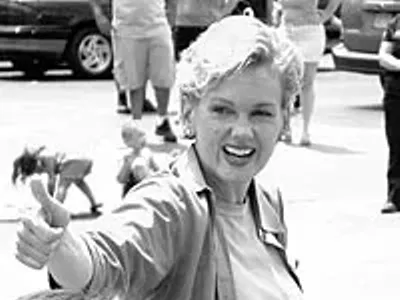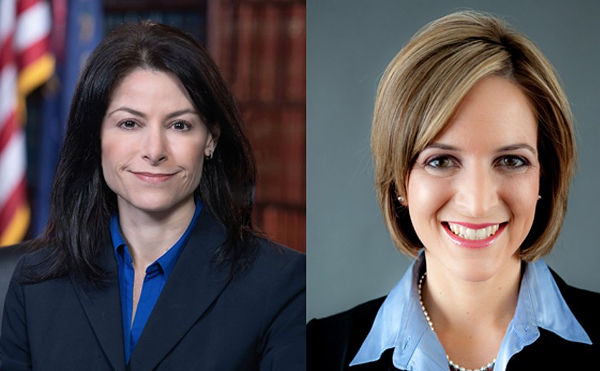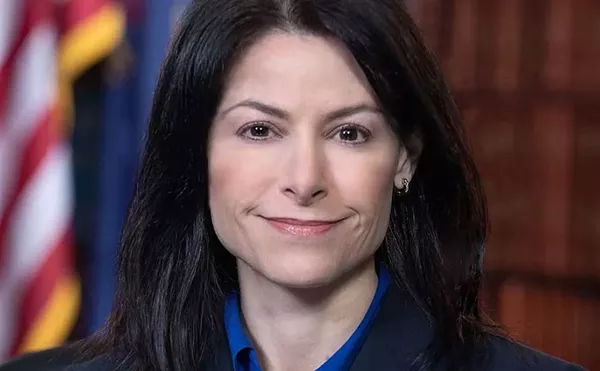
Audio By Carbonatix
[
{
"name": "GPT - Leaderboard - Inline - Content",
"component": "35519556",
"insertPoint": "5th",
"startingPoint": "3",
"requiredCountToDisplay": "3",
"maxInsertions": 100,
"adList": [
{
"adPreset": "LeaderboardInline"
}
]
}
]
Russell Simmons is a deep dude. The rap impresario is also quite the settled man these days. Well, aside from his cell phone and two-way pager, which are always on and buzzing with calls, and the constant interruptions that can double the length of a seven-minute interview, and the sound of people oogling for his attention as he gets out of his car and heads into a boardroom. Then he’s got to call you back, ’cause he’s going into a meeting. You never talk to him again, but he’s said plenty. Really, he has.
Simmons once told poet Sonia Sanchez that he found poetry more compelling than most contemporary rap music. Rap had not fallen out of favor with the founder and current chairman of Def Jam Records, one of the most influential independent record companies in hip-hop history. He’d just capitalized on the resurgent dynamic known as performance poetry.
“When you take the words away from the music,” he told Sanchez, “you have to have something to say.”
Simmons, with that sentiment, used his influence to create a platform for poetry similar to the one he’d formed for urban comics (Def Comedy Jam) and rappers. The success of Def Poetry’s inaugural season surprised HBO executives and America’s late-night viewing audience, attracting 4 million viewers a week. It was a national poetry house for the hip-hop generation. It was cool to be on to it, even cooler to appear on the show.
Simmons truly realized the appeal of Def Poetry when he and partner Stan Lathan seized an opportunity to take the show to Broadway last year. Thus Def Poetry on Broadway became a Tony Award-winning show, the first Broadway cast to win a Tony using material they’d written themselves. It also won a Peabody Award.
Five Michigan poets — Detroiters jessica Care moore, Goldie, Michael Ellison and Frenchie Davis, and Saginaw native Poetri — have appeared on the HBO version of Def Poetry, and this writer won the Def Poetry Grandslam tour when it came to Detroit in 2000.
The heavy mix of Detroiters involved in the show has helped to endear it to Motown’s community of poets and writers. This affinity promises to extend itself when Def Poetry on Broadway comes to Music Hall Dec. 30 through Jan. 4.
Simmons says he began Def Poetry more out of passion than pursuit of a profit, but it has proved to be marketable.
“Poetry for me is a very important thing because silence is golden,” he says. “You can’t bring anything bad out of your insides. Look at the dramatic difference from DMX speaking from silence, and speaking from music, Tupac speaking from silence, and speaking from music. Whatever they write from silence, it’s about their higher selves and greater aspirations. When they write from noise, it’s about the distractions of the world.”
Simmons, a vegan who practices yoga and refers to nature often when speaking, describes his awareness of poetry as “late.” He says by the time he became aware of it, the seed for its growth had already been planted.
“It just needs water,” he says. “Like Def Comedy Jam, Bernie Mac, Chris Tucker, Martin [Lawrence], those guys were already stars in their community. I just happened to be there.”
What Simmons calls “being there” others call pioneering. The man is a master at galvanizing burgeoning urban art forms and turning them into pop and cultural movements. Along the way, he makes people rich and redefines what America considers cool. Consensus says he’s a good person to hang with.
The voices of Def poets like Georgia Me can now be heard on Jeep commercials. Their words are scrawled on basketballs photographed for national Nike ads (Poetri wrote the poem, but the byline is attributed to Jason Kidd). They make commercials for Pepsi. One poet, Philadelphia native and Broadway cast member Black Ice, is even signed to Def Jam.
“It’s given me tremendous exposure on a national level,” says Ellison. “It’s increased my booking and travel schedule and made me more recognizable.”
Poetri says: “My show in L.A. draws 500 people a night.”
He now lives in California and also performs with the Broadway cast. Ex-Cosby kid Malcolm Jamal Warner and actress Rosario Dawson are among the sprinkle of famous faces who’ve dropped by his weekly open mic.
Poetri attributes the rise in popularity of verse to the fact that most poets do not set out to become stars, at least not before Def Poetry came to be. He fears what might happen if it does follow the growth trend of hip hop.
“Poets come up to me after the Broadway show all the time and say, ‘How can I get on HBO?’” he says. “True poetry does not do that. It comes from the heart. When you start writing to get on shows like HBO, you sell yourself out. That’s what happened to hip hop. Record companies started telling people, ‘Yo, write about killin’ people, killin’ your mother.’ That’s my fear. People will start writing poetry to make money.”
Ellison echoes Simmons’ sentiment, saying that, even though the current waves of popular poets are offshoots of hip-hop culture, there is a greater air of responsibility around them.
“Writing words without music, the content has to be more compelling,” he says. “With music, you can ride a beat and say nothing. If the track is hot, people will vibe with you. But without the music, it forces you to write with more integrity and clarity.”
The eight-member cast of Def Poetry on Broadway is as diverse as the millions of kids who have adopted hip hop as their lifestyle of choice. They are African-American, Latino and Latina, Asian and Indian, Southern, Northern, funky and corny. They do, however, have one thing in common.
They write from silence.
Khary Kimani Turner breaks it down for Metro Times. E-mail kturner@metrotimes.com




